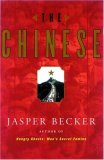Summary | Excerpt | Reviews | Readalikes | Genres & Themes | Author Bio

Critics' Opinion:
Readers' Opinion:
First Published:
Dec 2000, 304 pages
Paperback:
Feb 2002, 493 pages
During Qinshi Huangdi's reign, his prime minister Li Si took further steps to create an efficient totalitarian state by nationalizing land and ensuring a grain surplus. A key responsibility of the civilian bureaucracy was, and still is, to guard against floods by building dykes, to levy a grain tax on the harvest, and to store and distribute the surplus to feed the urban population and, above all, the army.
Under Qinshi Huangdi this efficient and highly organized state conquered its larger and more sophisticated rivals and succeeded in 'unifying' China. The boundaries of the state were smaller than those of today's China but included the heartlands where the vast majority of China's population still lives. These comprise the two biggest river valley systems in eastern Asia, that of the Yellow River and the Yangtze, including the Sichuan plain upstream, the vast North China plain that stretches south from Beijing and, richest of all, the land of rivers, canals and lakes between the two great rivers.
In the conquered lands all traces of the inhabitants' original culture, language and ethnicity were expunged. The territory was divided into thirty-four administrative units, just as today China is divided into thirty-four units, each ruled by appointed plenipotentiaries. Weights and measures were standardized as was the width of axles on vehicles so that carts and chariots could follow the same ruts on the imperial roads. In his eleven years in power, the First Emperor also established a single currency and a single script with 3,000 characters, the basis of today's writing system. Equally important, he 'unified' people's thoughts, as the current government might put it, by famously burning all books apart from Legalist works. Recalcitrant scholars were branded and sent to build the Great Wall and the most influential, some 460, were buried alive.
Prior to the Qin conquests, there had been a period in China when 'a hundred schools of thought contended' including that of Confucius (551-479 BC). He favoured the old rural aristocracy and a style of government that exuded a sense of benevolence and mutual respect between classes. A gentleman, a superior man, had to act according to a code of conduct, to observe a sense of noblesse oblige towards the lower orders. In the Qin state, however, power was everything, and while everyone had duties few had rights. Religion played its part, for the Emperor was regarded as the Son of Heaven who interceded on behalf of the people, but there was no organized church in the sense that there was in medieval Europe. The explicit goal of any treatise on government was, and still remains, how to establish 'a rich and powerful country'.
The Qin empire ended in a rebellion by Liu Bang, a minor official who in 208 BC led a revolt by former aristocrats who wished to re-establish the former kingdoms. The founder of the Han dynasty, which was to endure for 400 years, Liu Bang retained the unified state with its centralized bureaucracy, the Qin penal code and the Legalist political system. However, the worst excesses of the Qin system were modified and its harsh morality softened by the adoption of Confucianism. The Han dynasty made a knowledge of Confucian texts the cornerstone of government recruitment but beneath this veneer, Legalism remained the basis of Chinese government right up until the twentieth century. Even the Mongols and Manchus, who at one time or another conquered China and ruled its people, retained the same political system.
Today Chinese society is still not unlike that of the Han dynasty. Then, out of every hundred people, eighty or ninety were peasants in the countryside. That is still the case today. Then a peasant was obliged to give a month of his labour free for work on state projects such as building dykes or roads and to be ready for military conscription. Today, China's peasants must fulfil the same obligations, and, like their ancestors, they farm the land but do not own it and cannot leave it without permission. In Han times in each county absolute power was concentrated in the hands of the magistrate, who dispensed justice and issued orders on all aspects of administration, just as a Party secretary does today. The magistrate's work was subject to inspection tours by his superiors and after a fixed number of years he was rotated to another position. He lived in a 'yamen' where all civil offices responsible for taxes, education, the army, the police, justice and civil engineering were based. The same is true today.
Copyright © 2001 by Jasper Becker.





The Flower Sisters
by Michelle Collins Anderson
From the new Fannie Flagg of the Ozarks, a richly-woven story of family, forgiveness, and reinvention.

The House on Biscayne Bay
by Chanel Cleeton
As death stalks a gothic mansion in Miami, the lives of two women intertwine as the past and present collide.

The Funeral Cryer by Wenyan Lu
Debut novelist Wenyan Lu brings us this witty yet profound story about one woman's midlife reawakening in contemporary rural China.
Your guide toexceptional books
BookBrowse seeks out and recommends the best in contemporary fiction and nonfiction—books that not only engage and entertain but also deepen our understanding of ourselves and the world around us.